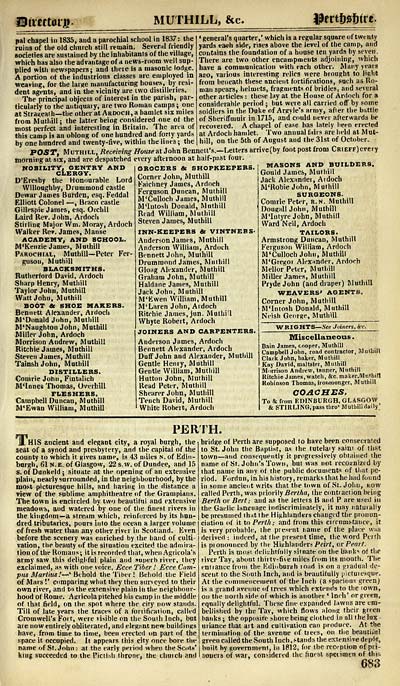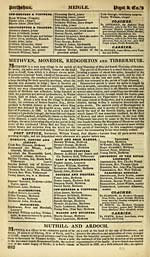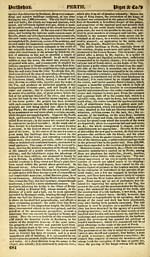Scotland > 1837 - Pigot and Co.'s national commercial directory for the whole of Scotland and of the Isle of Man
(669)
Download files
Complete book:
Individual page:
Thumbnail gallery: Grid view | List view

Bixtttovn
MUTHILL, &c.
J^ertj^jsj^tre.
pal chapel in 1835, and a parochial school in 1837: the
ruins of the old church still remain. Several friendly
eocieties are sustained hy the inhabitants of the village,
which has also the advantage of a news-room well sup-
plied with newspapers ; and there Is a masonic lodge.
A portion of the industrious classes are employed in
weaving, for the large manufacturing houses, by resi-
dent agents, and in the vicinity are two disiilleries.
The principal objecis of interest in the parish, par-
ticularly to the antiquary, are two Roman camps ; one
at Straneath— the other at Ardoch, a hamlet six miles
from Muthill; the latter being considered one ot the
most perfect and interesting in Britain. 'I he an-a of
this camp is an oblong of one hundred and forty yards
by one hundred and twenty-five, within the lines ; the
* general's quarter,' which is a regular square of twenty
yards eaeh side, rises above the level of the camp, and
contains the foundation of a house ten yards by seven.
There are two other encampments adjoining, which
have a communicaiion with each other. Many years
aco, various interesting relics were brought to light
from beneath these ancient fortifications, such as Ro-
man spears, helmets, fragments of bridleS; and several
other articles : these lay at the House of Ardoch for a
considerable period ; but were all carried oflf by some
soldiers in the Duke of Argyle's army, after the battle
of Sheriffmuir in 1715, and could ne'ver afterwards be
recovered. A chapel of ease has lately been erected
at Ardoch hamlet. Two annual fairs are held at M ut-
hiU, on the 5th of August and the 31st of October.
POST, Muthill, Receiving House At John Bennett's.— Letters arrive(by foot post from CRiEFF)erery
morning at six, and are despatched every afternoon at half-past foui.
NOBIIilTY, GENTRY AND
CLERGY.
D'Ereshy the Honourable Lord
Willonghby, Drummond castle
Dewar James Burden, esq. Feddal
Elliott Colonel — , Braco castle
Gillespie James, esq. Orchil
Laird Rev. Johb, Ardoch
Stirling Major Wm. Moray, Ardoch
Walker Rev. James, Manse
ACADEMY, AND SCHOOL.
M*Kenzie James, Muthill
Parochial, Muthill— Peter Fer-
' guson, ftluthill
BLACKSMITHS.
Rutherford David, Ardoch
Sharp Henry, Muthill
Taylor John, Muthill
Watt John, Muthill
BOOT et SHOE MAKERS.
Bennett Alexander, Ardoch
M'Donald John, Muthill
M'Naughton John, Muthill
Miller John, Ardoch
Morrison Andrew, Muthill
Ritchie James, Muthill
Steven James, Muthill
Tain&hJohn, Muthill
DISTILLERS.
Comrie John, Fintalich
M'Innes Thomas, Overhill
FLESHERS.
Campbell Duncan, Muthill
M'Ewan William, Muthill
GROCERS & SHOPKEEPERS.
Corner John, Muthill
Faichney James, Ardoch
Ferguson Duncan, Muthill
M'CuUoch James, Muthill
M'lntosh Donald, Muthill
Read William, Muthill
Steven James, Muthill
INN-KEEPERS «e VINTNERS-
Anderson James, Muthill
Anderson William, Ardoch
Bennett John, Muthill
Drummond James, Muthill
Gloag Alexander, Muthill
Graham John, Muthill
Haldane James, Muthill
Jack John, Muthill
M'Kwen William, Muthill
M'Laren John, Ardoch
Ritchie James, jun. Muthill
Whyte Robert, Ardoch
JOINERS AND CARPENTERS.
Anderson James, Ardoch
Bennett Alexander, Ardoch
DufFJohn and Alexander, Muthill
Gentle Henry, Muthill
Gentle William, Muthill
Hutton John, Muthill
Read Peter, Muthill
Shearer John, Muthill
Tench David, Muthill
White Robeit, Ardoch
MASONS AND BUILDERS,
Gould James, Muthill
Jack Alexander, Ardoch
M'Robie John, Muthill
SURGEONS.
Comrie Peter, r.n. Muthill
Dougall John, Muthill
M'Intyre John, Muthill
Ward Neil, Ardoch
TAILORS.
Armstrong Duncan, Muthill
Ferguson William, Ardoch
M'Culloch John, Muthill
M'Gregor Alexander. Ardoch
Mellor Peter, Muthill
Miller James, Muthill
PrydeJohn (and draper) Muthill
•WEAVERS' AGENTS.
Corner John, Muthill
M'lntosh Donald, Muthill
Neish George, Muthill
V^RIGHTS— See Joiners, Ifc.
Miscellaneous.
Bain James, cooper, Muthill
Campbell John, road contractor, Muthill
Clark John, baker, Muthill
Kay David, maltster, Muthill
Morrison Andrew, tanner, Muthill
Ritchie James, watch, &c. maker.Mutbill
Robinson Thomas, ironmonger, Muthill
To
&
COACHES,
& fiom EDINBURGH, GLASGOW
: STIRLING, pass tliro' Muthill daily'
PERTH.
Jl HIS ancient and elegant city, a royal burgh, the
seat of a synod and presbytery, and the capital of the
county to which it gives name, i,s 43 miles n. of Edin-
burgh, 61 n.e. of Glasgow, 22S.VV. of Dundee, and 15
s. of Dunkeld ; situate at the opening of an extensive
plain, nearly surrounded, in the neighbourhood, by the
most picturesque hills, and having in the distance a
view of the sublime amphitheatre of the Grampians.
The town is encircled by two beautiful and extensive
meadows, and watered by one of the finest rivers in
the kingdom— a stream which, reinforced by its hun-
dred tributaries, pours into the ocean a larger volume
of fresh water than any other river in Scotland. Even
before the scenery was enriched by the hand of culti-
vation, the beauty of the situation excited the adniiia-
tion of the Romans; it is recorded that, when Agricola's
army saw this delighful plain and superb river, they
exclaimed, as with one voice, Ecce Tiber ! Ecce Cam-
pus Martius! — 'Behold the Tiber! Behold the Field
of Mars I' comparing what they then surveyed to their
own river, and to the extensive plain in the neighbour-
liood of Rome. Agricola pitched his camp in the middle
of that field, on the spot where the city now stands.
Till of late years the traces of a foriificaiion, called
Cromwell's Fort, were visible on the South Inch, but
are now entirely obliterated, and elegant new buildings
have, from time to time, been erected on part of the
space it occupied. It appears this city once bore the
name of St. John: at the early period when the Scuts'
king succeeded to the Pictish throne, the cliuich and
bridge of Perth are supposed to have been consecrated
to St. John the Baptist, as the tutelaiy saint of that
town— and consequently it progressively obtained the
name of St. John's Town, but was not recoanized by
that name in any ot the public documents of tliat pe-
riod. Fordun, in his history, remarks that he had fonnd
in some ancient writs that'the town of St. John, now
called Perth, was \>\\Qv\\y Bertha, the contraction being
Berth or Bert; and as the letters B and P are used in
the Gaelic language indiscriminately, it may naturally
be presumed that the Highlanders changed the pronun-
ciation of it to Perth; and from this circumstance, it
is very probable, the present name of the place was
derived : indeed, at the present time, the word Perth
is piononnced by the Highlanders P«W, or Peart.
Perth is mosi rielis;htfully situate on the banks of the
river Tay, about thirty-fiie miles from its mouth. The
entiance from the Edinbureh load is on a giadual de-
scent to the South Inch, and is beautifully picturesque.
At the commencement of the Inch (a spacious green)
is a grand avenue of trees which extends to the town,
on the north side of which is another ' Inth' or green,
equally delightful. These fine expanded lawns are em-
bellislied by the Tay, which flows along their green
hanks ; the opposite shore being clothed in all the lux -
uriance that art and cultivation can produce. At the
termination of the avenue of tiees, on the beautiiul
green called the South Inch , stands the extensive dep6t,
built by government, in 1812, for the reception of pri-
soners of war, considered the finest speiimen of this
MUTHILL, &c.
J^ertj^jsj^tre.
pal chapel in 1835, and a parochial school in 1837: the
ruins of the old church still remain. Several friendly
eocieties are sustained hy the inhabitants of the village,
which has also the advantage of a news-room well sup-
plied with newspapers ; and there Is a masonic lodge.
A portion of the industrious classes are employed in
weaving, for the large manufacturing houses, by resi-
dent agents, and in the vicinity are two disiilleries.
The principal objecis of interest in the parish, par-
ticularly to the antiquary, are two Roman camps ; one
at Straneath— the other at Ardoch, a hamlet six miles
from Muthill; the latter being considered one ot the
most perfect and interesting in Britain. 'I he an-a of
this camp is an oblong of one hundred and forty yards
by one hundred and twenty-five, within the lines ; the
* general's quarter,' which is a regular square of twenty
yards eaeh side, rises above the level of the camp, and
contains the foundation of a house ten yards by seven.
There are two other encampments adjoining, which
have a communicaiion with each other. Many years
aco, various interesting relics were brought to light
from beneath these ancient fortifications, such as Ro-
man spears, helmets, fragments of bridleS; and several
other articles : these lay at the House of Ardoch for a
considerable period ; but were all carried oflf by some
soldiers in the Duke of Argyle's army, after the battle
of Sheriffmuir in 1715, and could ne'ver afterwards be
recovered. A chapel of ease has lately been erected
at Ardoch hamlet. Two annual fairs are held at M ut-
hiU, on the 5th of August and the 31st of October.
POST, Muthill, Receiving House At John Bennett's.— Letters arrive(by foot post from CRiEFF)erery
morning at six, and are despatched every afternoon at half-past foui.
NOBIIilTY, GENTRY AND
CLERGY.
D'Ereshy the Honourable Lord
Willonghby, Drummond castle
Dewar James Burden, esq. Feddal
Elliott Colonel — , Braco castle
Gillespie James, esq. Orchil
Laird Rev. Johb, Ardoch
Stirling Major Wm. Moray, Ardoch
Walker Rev. James, Manse
ACADEMY, AND SCHOOL.
M*Kenzie James, Muthill
Parochial, Muthill— Peter Fer-
' guson, ftluthill
BLACKSMITHS.
Rutherford David, Ardoch
Sharp Henry, Muthill
Taylor John, Muthill
Watt John, Muthill
BOOT et SHOE MAKERS.
Bennett Alexander, Ardoch
M'Donald John, Muthill
M'Naughton John, Muthill
Miller John, Ardoch
Morrison Andrew, Muthill
Ritchie James, Muthill
Steven James, Muthill
Tain&hJohn, Muthill
DISTILLERS.
Comrie John, Fintalich
M'Innes Thomas, Overhill
FLESHERS.
Campbell Duncan, Muthill
M'Ewan William, Muthill
GROCERS & SHOPKEEPERS.
Corner John, Muthill
Faichney James, Ardoch
Ferguson Duncan, Muthill
M'CuUoch James, Muthill
M'lntosh Donald, Muthill
Read William, Muthill
Steven James, Muthill
INN-KEEPERS «e VINTNERS-
Anderson James, Muthill
Anderson William, Ardoch
Bennett John, Muthill
Drummond James, Muthill
Gloag Alexander, Muthill
Graham John, Muthill
Haldane James, Muthill
Jack John, Muthill
M'Kwen William, Muthill
M'Laren John, Ardoch
Ritchie James, jun. Muthill
Whyte Robert, Ardoch
JOINERS AND CARPENTERS.
Anderson James, Ardoch
Bennett Alexander, Ardoch
DufFJohn and Alexander, Muthill
Gentle Henry, Muthill
Gentle William, Muthill
Hutton John, Muthill
Read Peter, Muthill
Shearer John, Muthill
Tench David, Muthill
White Robeit, Ardoch
MASONS AND BUILDERS,
Gould James, Muthill
Jack Alexander, Ardoch
M'Robie John, Muthill
SURGEONS.
Comrie Peter, r.n. Muthill
Dougall John, Muthill
M'Intyre John, Muthill
Ward Neil, Ardoch
TAILORS.
Armstrong Duncan, Muthill
Ferguson William, Ardoch
M'Culloch John, Muthill
M'Gregor Alexander. Ardoch
Mellor Peter, Muthill
Miller James, Muthill
PrydeJohn (and draper) Muthill
•WEAVERS' AGENTS.
Corner John, Muthill
M'lntosh Donald, Muthill
Neish George, Muthill
V^RIGHTS— See Joiners, Ifc.
Miscellaneous.
Bain James, cooper, Muthill
Campbell John, road contractor, Muthill
Clark John, baker, Muthill
Kay David, maltster, Muthill
Morrison Andrew, tanner, Muthill
Ritchie James, watch, &c. maker.Mutbill
Robinson Thomas, ironmonger, Muthill
To
&
COACHES,
& fiom EDINBURGH, GLASGOW
: STIRLING, pass tliro' Muthill daily'
PERTH.
Jl HIS ancient and elegant city, a royal burgh, the
seat of a synod and presbytery, and the capital of the
county to which it gives name, i,s 43 miles n. of Edin-
burgh, 61 n.e. of Glasgow, 22S.VV. of Dundee, and 15
s. of Dunkeld ; situate at the opening of an extensive
plain, nearly surrounded, in the neighbourhood, by the
most picturesque hills, and having in the distance a
view of the sublime amphitheatre of the Grampians.
The town is encircled by two beautiful and extensive
meadows, and watered by one of the finest rivers in
the kingdom— a stream which, reinforced by its hun-
dred tributaries, pours into the ocean a larger volume
of fresh water than any other river in Scotland. Even
before the scenery was enriched by the hand of culti-
vation, the beauty of the situation excited the adniiia-
tion of the Romans; it is recorded that, when Agricola's
army saw this delighful plain and superb river, they
exclaimed, as with one voice, Ecce Tiber ! Ecce Cam-
pus Martius! — 'Behold the Tiber! Behold the Field
of Mars I' comparing what they then surveyed to their
own river, and to the extensive plain in the neighbour-
liood of Rome. Agricola pitched his camp in the middle
of that field, on the spot where the city now stands.
Till of late years the traces of a foriificaiion, called
Cromwell's Fort, were visible on the South Inch, but
are now entirely obliterated, and elegant new buildings
have, from time to time, been erected on part of the
space it occupied. It appears this city once bore the
name of St. John: at the early period when the Scuts'
king succeeded to the Pictish throne, the cliuich and
bridge of Perth are supposed to have been consecrated
to St. John the Baptist, as the tutelaiy saint of that
town— and consequently it progressively obtained the
name of St. John's Town, but was not recoanized by
that name in any ot the public documents of tliat pe-
riod. Fordun, in his history, remarks that he had fonnd
in some ancient writs that'the town of St. John, now
called Perth, was \>\\Qv\\y Bertha, the contraction being
Berth or Bert; and as the letters B and P are used in
the Gaelic language indiscriminately, it may naturally
be presumed that the Highlanders changed the pronun-
ciation of it to Perth; and from this circumstance, it
is very probable, the present name of the place was
derived : indeed, at the present time, the word Perth
is piononnced by the Highlanders P«W, or Peart.
Perth is mosi rielis;htfully situate on the banks of the
river Tay, about thirty-fiie miles from its mouth. The
entiance from the Edinbureh load is on a giadual de-
scent to the South Inch, and is beautifully picturesque.
At the commencement of the Inch (a spacious green)
is a grand avenue of trees which extends to the town,
on the north side of which is another ' Inth' or green,
equally delightful. These fine expanded lawns are em-
bellislied by the Tay, which flows along their green
hanks ; the opposite shore being clothed in all the lux -
uriance that art and cultivation can produce. At the
termination of the avenue of tiees, on the beautiiul
green called the South Inch , stands the extensive dep6t,
built by government, in 1812, for the reception of pri-
soners of war, considered the finest speiimen of this
Set display mode to: Large image | Transcription
Images and transcriptions on this page, including medium image downloads, may be used under the Creative Commons Attribution 4.0 International Licence unless otherwise stated. ![]()
| Scottish Post Office Directories > Scotland > Pigot and Co.'s national commercial directory for the whole of Scotland and of the Isle of Man > (669) |
|---|
| Permanent URL | https://digital.nls.uk/85592692 |
|---|
| Description | Directories of the whole, or large parts of, Scotland. |
|---|
| Description | Around 700 Scottish directories published annually by the Post Office or private publishers between 1773 and 1911. Most of Scotland covered, with a focus on Edinburgh, Glasgow, Dundee and Aberdeen. Most volumes include a general directory (A-Z by surname), street directory (A-Z by street) and trade directory (A-Z by trade). |
|---|


